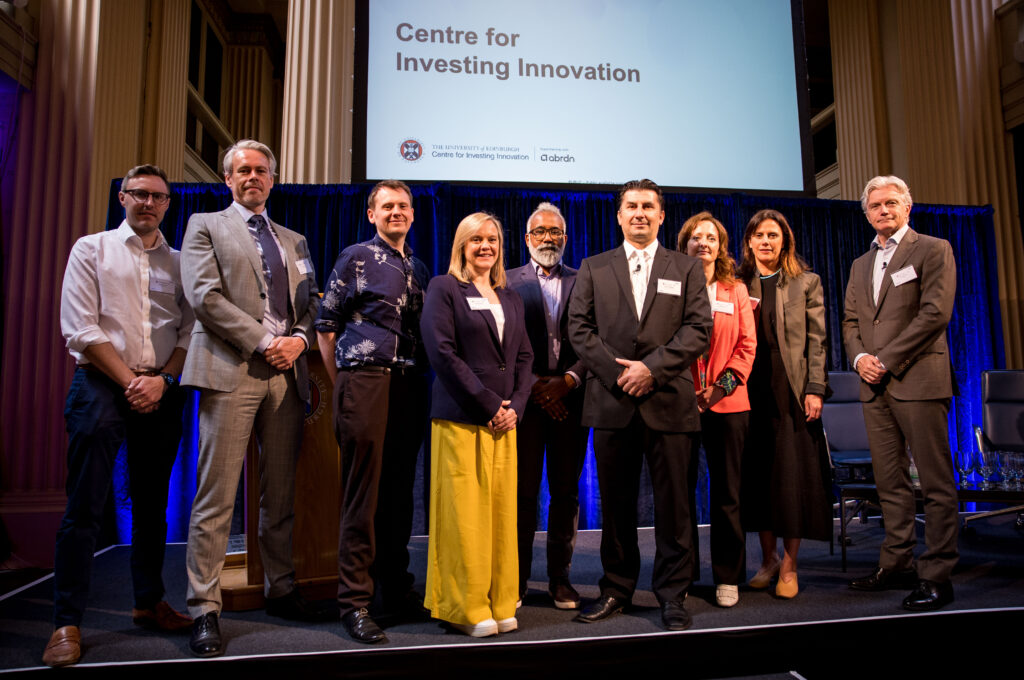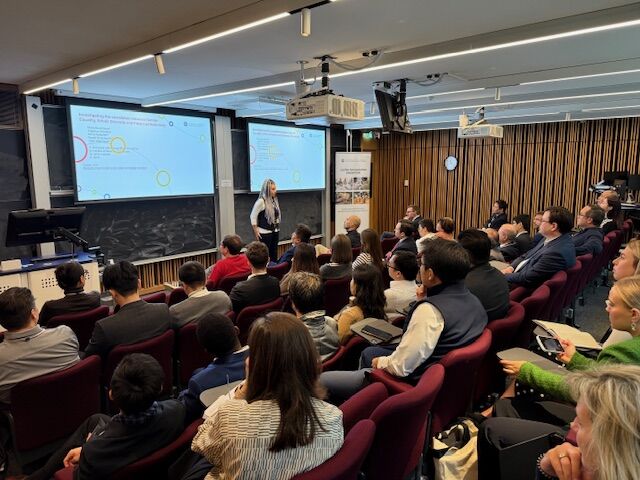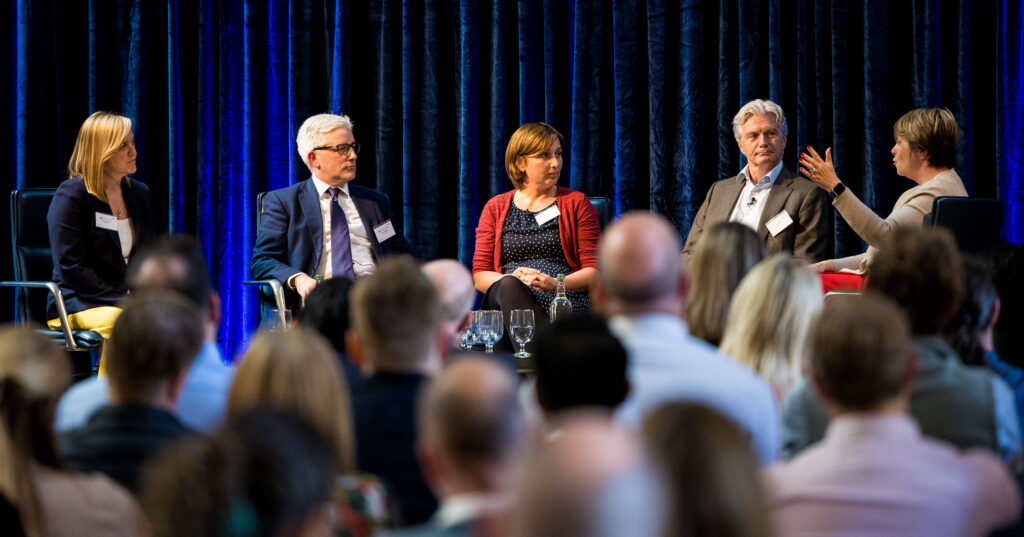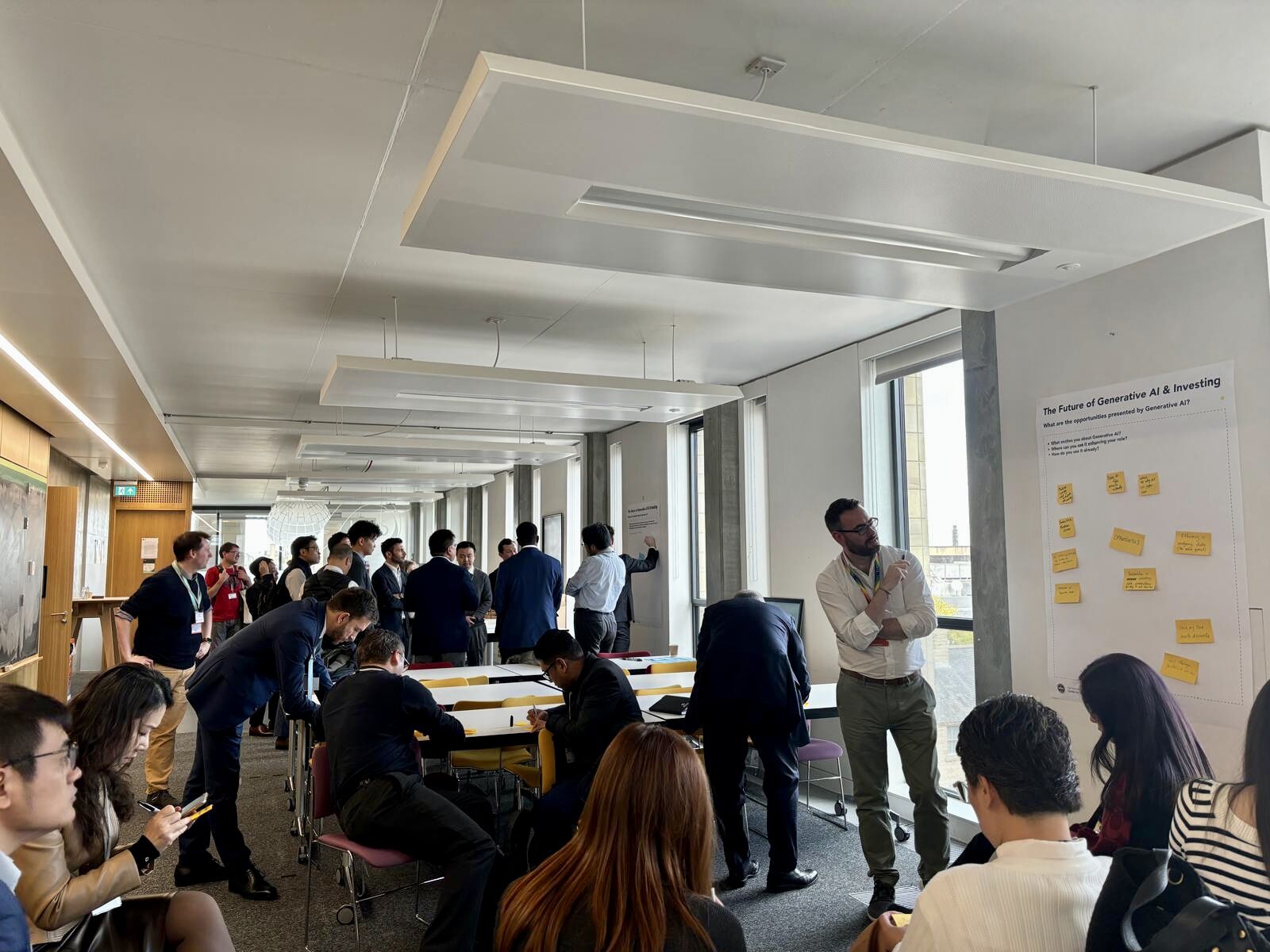The Centre for Investing Innovation is a collaboration between the University of Edinburgh and leading global investment company aberdeen, established in 2022 with a £7.5 million investment over five years. Based within the Edinburgh Futures Institute, the Centre brings together world-class expertise from across academia and industry to address some of the most pressing challenges and opportunities in the investment and asset management sectors.

At the heart of the Centre’s mission is a commitment to reimagine the future of investing—developing innovative, responsible, and data-driven approaches that generate long-term improvements for both investors and society. Our research is built around three strategic priorities:
- Sustainability: advancing tools and metrics for responsible investing and exploring how environmental, social, and governance (ESG) considerations can be embedded meaningfully into investment strategies.
- Thematic Investing: identifying and evaluating emerging investment themes with potential for positive societal impact, including public-sector innovation and future-focused sectors.
- Innovating Investing: harnessing the power of cutting-edge technologies—such as artificial intelligence, machine learning, and advanced data science—to enhance investment research, decision-making, and transparency.
“At the Centre for Investing Innovation, we fuse data, AI, cutting-edge research and industry insight to shape smarter, more responsible investment strategies – where algorithms align with ethics and technology drives sustainable, high-impact value for clients, society, and the economy.”
Professor Sotirios Sabanis – Director, Centre for Investing Innovation
Expressions of interest
We operate an open call for expressions of interest for proposals under our three thematic areas.
Open to University of Edinburgh staff only.
Register expression of interestProjects
Our research projects are collaborative by design, drawing on the diverse strengths of interdisciplinary teams. Each project brings together PhD students, postdoctoral researchers, early-career academics, and senior professors, ensuring a rich blend of fresh perspectives and deep expertise. Working in close partnership with aberdeen and other external stakeholders, these teams co-create research that is both academically rigorous and practically grounded.
We’ve already funded nearly £2m in projects, and we continue to welcome collaboration with students, researchers, and industry professionals who share our vision of transforming investing for a better future.

Working Seminar Series: Dr Maria Boutchkova presents the findings of the CII-funded project “Investigating the correlation between Gender Equality, Ethnic Diversity and Financial Materiality”
Prominent Scholars Lecture Series
The Centre for Investing Innovation’s Prominent Scholars Lecture series is a platform for discovery and dialogue, featuring renowned researchers whose work challenges assumptions, advances understanding, and opens new pathways for collaboration and impact.
Monday, March 31st, 2025
Operationalizing Contextual Integrity in Privacy-Conscious Assistants
Dr Sahra Ghalebikesabi (Research Scientist at Google DeepMind)
Advanced AI assistants combine frontier LLMs and tool access to autonomously perform complex tasks on behalf of users. While the helpfulness of such assistants can increase dramatically with access to user information including emails and documents, this raises privacy concerns about assistants sharing inappropriate information with third parties without user supervision. To steer information-sharing assistants to behave in accordance with privacy expectations, we propose to operationalise contextual integrity (CI), a framework that equates privacy with the appropriate flow of information in a given context. In particular, we design and evaluate a number of strategies to steer assistants’ information-sharing actions to be CI-compliant. Our evaluation is based on a novel form-filling benchmark composed of human annotations of common webform applications, and it reveals that prompting frontier LLMs to perform CI-based reasoning yields strong results.
Biography
Sahra is a Research Scientist at Google DeepMind where she works on privacy-aware LLM-based agents. Her doctoral thesis on tackling privacy and model misspecification within generative modelling was funded by the Microsoft Research PhD fellowship, the EPSRC and Novartis. Previously, she worked with the Health Intelligence team at Microsoft Research Cambridge on robust representation learning and in the Robust and Verified AI group at Google DeepMind.
Sahra was a Communications Chair at NeurIPS 2022 and 2023, and was previously AISTATS 2022 Publications Chair. She co-organised the MINT workshop at NeurIPS 2024, and the I can’t believe it’s not better – workshop at NeurIPS 2022 and 2023.
Friday, 10th May 2024
Divide-and-Conquer Posterior Sampling for Denoising Diffusion Priors
Prof Eric Moulines (Ecole Polytechnique, Member of the French Academy of Sciences).
Recent advancements in Bayesian inverse problem-solving have spotlighted Denoising Diffusion Models (DDMs) as effective priors. Despite their potential, the challenge lies in efficient sampling from the complex posterior distribution these models yield. Classical approaches necessitate either cumbersome retraining of model-specific components to align with the likelihood or introduce approximation errors affecting the accuracy of the posterior. In our study, we introduce an innovative framework that leverages the inherent structure of DDMs to construct a series of simplified diffusion guidance problems. This novel method significantly reduces the approximation error associated with current techniques, without the need for retraining. We demonstrate the versatility and effectiveness of our approach across a broad spectrum of Bayesian inverse problems.
Biography
Éric Moulines is a Professor of Statistics at École Polytechnique and a leading expert in computational statistics, machine learning, and signal processing. He is the Scientific Co-Director of HI! Paris, an interdisciplinary research centre dedicated to artificial intelligence and data science. Moulines has received major honours, including the CNRS Silver Medal in 2010, and was elected to the French Academy of Sciences in 2017.

Working Seminar Series
The Centre for Investing Innovation’s Working Seminar Series is where new ideas in investing take shape. Exploring some of the most pressing challenges and exciting opportunities in the investment world, these interactive sessions feature work-in-progress papers and emerging ideas, enabling presenters to receive constructive feedback from practising investment professionals.
Each session features a presentation, giving participants a first look at the research and trends that will define the future of finance, followed by an interactive discussion.
Presenter: Dr Emily Allaway (Chancellor’s Fellow at the University of Edinburgh in the School of Informatics.)
Abstract: Financial sentiment analysis (FSA) includes both detecting sentiment in financial data and using sentiment analysis for downstream financial applications. In this talk, I will focus on the first case.
In particular, I will begin by reviewing the current state of work on interpretable and explainable methods for detecting sentiment in financial data. I will then discuss potential approaches to address some of the challenges in this area, drawing from work in related areas of NLP.
Presenter: Prof Yizhe Dong (Professor in Banking and Risk Analytics at the University of Edinburgh Business School.)
Abstract: In this talk, I will discuss recent developments in the application of Generative AI and large language models (LLMs) in the field of finance. I will then present two of my research projects that explore how Generative AI and LLMs can be integrated into the credit risk modelling process. Finally, I will highlight the potential implications of using Generative AI/LLMs to address missing data issues, which are relevant to the ongoing company project.
Presenter: Sahra Ghalebikesabi
Abstract: Large Language Models (LLMs) have undergone rapid evolution, transforming the landscape of artificial intelligence. This talk will provide an overview of recent advancements, focusing on key trends shaping the field in 2025. We will explore the shift towards:
- thinking models
- tool use and agents
- specialization and customization incl. applications within finance
Presenter: Sunnie Li, School of Informatics, Institute for Language, Cognition and Computation
Abstract: Analysing financial reports such as 10-K filings presents challenges due to their length, complexity, and domain-specific language, making efficient retrieval difficult for financial NLP systems and retrieval-augmented generation (RAG) models. To address this, we introduce FinGEAR (Financial Mapping-Guided Enhanced Answer Retrieval), a hierarchical retrieval framework for full-document financial analysis. FinGEAR integrates pre-built financial keyword mapping and hierarchical indexing, enabling hybrid navigation that enhances precision and scalability. By leveraging structured document organisation and semantic clustering, it efficiently directs queries to relevant sections, minimising unnecessary retrieval while preserving contextual relevance. Empirical evaluations show that FinGEAR outperforms state-of-the-art retrieval models, improving accuracy and factual consistency to support informed decision-making for analysts, investors, and stakeholders.
Presenter: Mengyu Wang, School of Informatics, Centre for Doctoral Training in Natural Language Processing
Abstract: Domain Quantitative Reasoning remains a significant challenge for Large Language Models, particularly in fields requiring expert knowledge and complex question answering (QA). This study presents a novel Expert Question Decomposition (EQD) approach to enhance domain-specific reasoning performance. Our method includes two training stages: domain fine-tuning and QA expert alignment, designed to generate targeted supporting questions that optimize the reasoning process. We evaluate our method in the financial domain, an area characterized by specialized knowledge and complex quantitative reasoning requirements. Experimental results across four financial datasets demonstrates the method’s effectiveness and efficiency. Our EQD method requires minimal fine-tuning resources, reduces inference time compared to existing prompting methods, and achieves consistent performance improvements ranging from 0.4% to 6.8% across different LLMs. Notably, our analysis reveals that: for LLMs, a single well-crafted supporting question proves more effective than multiple reasoning steps, offering new insights into LLM reasoning mechanisms in specialized domains.
Presenter: Tim Cannings, Director of the University of Edinburgh Centre for Statistics
Abstract: “One of the ironies of working with big data is that missing data play an ever more significant role.” **
The challenges associated with missingness have increased substantially as data is now routinely collected and stored without consideration of its quality. Traditional approaches, such as those based on first imputing any missing entries or simply using a complete case analysis, are typically no longer viable. There is therefore pressing need for new algorithms that are designed with missing data in mind.
In this talk, I will give an overview of some recent progress on dealing with missing data. This will include a general introduction to the topic and some universal strategies (both good and bad). I will then present some of my own work on the topic, covering (a subset of) the Correlation-Assisted Missing data (CAM) estimator, the Hard-thresholding Anova Missing data (HAM) algorithm for nonparametric classification, as well as some ongoing work on kernel machines with missing data.
**Quote from Zhu et al. (2022, High-dimensional principal component analysis with heterogeneous missingness, JRSSB)
Presenter: Christos Christodoulopoulos, Amazon Artificial General Intelligence organisation)
Abstract: In this talk, I will discuss the current state of Generative AI “Foundation Models” (LLMs, Diffusion Models). We will look at how we got here, dive into (some of) the details of how these giant models get built, and go beyond off-the-shelf usage to how such models can be customised to meet specific needs. I will also cover recent and not-so-recent developments like multimodal AI, Retrieval-Augmented Generation (RAG), reasoning models (Open AI’s o3, DeepSeek’s R1), and AI Agents (Open AI’s Operator). Finally, I will talk about various risks that come with Generative AI models and what teams like mine are doing to address them.
Presenter: Tiejun Ma, Personal Chair of Financial Computing (Risk Modelling), Artificial Intelligence and its Applications Institute, School of Informatics
Abstract: In this talk, I will discuss my research group’s last several years of effort in modelling financial news, investors’ behaviour, and some of the latest work using LLMs and state-of-the-art machine learning models. For example, one of my PhDs worked on FININ (Financial Interconnected News Influence Network), a novel market prediction model that captures not only influences between news and prices but also the interactions among news items themselves. FININ effectively integrates multi-modal information from both market price and news articles. We conduct extensive experiments on two datasets, encompassing the S&P 500 and NASDAQ 100 indices over a 15-year period and over 2.7 million news articles. Another example is that analysing financial reports, such as 10-K filings, is essential for stakeholders seeking actionable insights into a company’s performance, yet the extensive length, hierarchical structure, and domain-specific language of these documents pose significant challenges for existing LLMs with retrieval-augmented generation (RAG) systems and domain-specific models like FinBERT/FinGPT. I will have a light touch for each of these pieces of work with overviews, lessons learned and future.
Speaker: Miguel de Carvalho
Summary: In this talk, I will provide a primer on modern neural statistical models, covering various architectures and addressing aspects of explainability. I will highlight implications for fintech, with a focus on opportunities for the CII research companion projects.

News
abrdn and Edinburgh join forces to develop an AI investment tool

abrdn and the University of Edinburgh have announced a pioneering project out of their partnership Centre for Investing Innovation that will harness generative artificial intelligence (AI) to support the firm’s investment research process.
- AI vs the AI Expert: A conversation about the future of investing
15 July 2025 - How Edinburgh can bolster its position as a global asset management centre
6 June 2025 - Scotland’s asset management sector targets £1tn with new growth plan
14 May 2025 - aberdeen Investments announced as supporting partner to the 2025 Christmas Lectures
10 March 2025 - How data and AI are fuelling Scotland’s fintech boom
24 October 2024 - Abrdn announces AI partnership with University of Edinburgh
3 July 2024
Sponsorship
The Centre for Investing Innovation is proud to support initiatives that bring together researchers, industry partners, and students to explore cutting-edge developments in areas such as generative modelling, AI, and data science. By sponsoring events that encourage collaboration and the exchange of ideas across disciplines, the Centre helps create opportunities for innovation, skills development, and impactful real-world applications—strengthening the bridge between academic research and industry practice.
As part of the Isaac Newton Institute (INI) satellite programme on Diffusions in machine learning: Foundations, generative models and non-convex optimisation, the Centre, along with CRC Press, the London Mathematical Society, Springer, and Amazon, was the proud sponsor of a Hackathon Workshop on Generative Modelling hosted at the Edinburgh Futures Institute from July 8th- 12th 2024.
The workshop addressed four challenges:
Challenge 1: Hallucinations in Large Vision-Language Models
Challenge 2: Unlearning for Large Language Models
Challenge 3: Towards frugal zero-shot diffusion-based image restoration
Challenge 4: Implementing non-convex optimisation algorithms
By providing access to industry mentors, guidance from prominent academics, datasets, and creating platforms to showcase work, CII’s sponsorship of the Hackathon has opened clear pathways for the early-career researchers to build their profiles, form partnerships with stakeholders from a variety of industries, and collaborate with a variety of disciplines.
Meet the team
Led by Professor Sotirios Sabanis (School of Mathematics) and Professor John Vines (School of Informatics) and supported by a multidisciplinary team of researchers and industry experts, the Centre fosters a collaborative environment where academic rigour meets real-world impact. Our approach is rooted in co-creation, working closely with aberdeen and academics to develop practical, scalable solutions for the evolving financial landscape.












